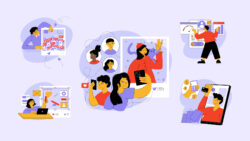Soft skills are vital to success in one’s personal and professional life. In today’s job market, employers want their candidates to be able to communicate effectively, collaborate with others, and think creatively — but which skills are most important for your students to possess?
To answer that question, Stukent asked 18 CEOs, managers, and other professionals which soft skills students will need in today’s workforce. Read on to learn their answers!
- Plays Well with Others
- Unifies the Company
- Can Persuade Others
- Thinks Creatively
- Manages Their Time
- Independent and Self-manages
- Problem-solves and Innovates
- Resolves Conflicts
- Receptive to Feedback
- Empathizes with Teammates and Customers
- Adapts to New Technology
- Has a Sense of Professionalism
- Rolls With the Punches
- Motivated by Curiosity
- Works with a Growth Mindset
- Influences Peers
- Thinks Critically
- Communicates Efficiently
1. Plays Well With Others
The “teamwork gene” is important to have in business. Even during the era of remote-first workforces, you must be able to work alongside other team members.
Taking on all the tasks and refusing to share responsibilities raises a lot of alarm bells. At the very least, it shows that you have a lack of trust among your coworkers. Too much of a loner mentality is a bad sign.
One of the most important soft skills anyone could have is the ability to work collaboratively with others. It raises the morale of a workplace while also raising the team’s achievement potential. Strength in numbers is a real thing; you’re always stronger with a group.
Brittany Dolin, Cofounder, Pocketbook Agency
2. Unifies the Company
There’s a massive list of soft skills in the workforce, but being able to create alignment is crucial. In order for new ideas to take root or to make meaningful changes within an organization, someone has to create unity and consensus throughout the company.
Developing and leveraging that soft skill can cause more effective execution for any effort.
Logan Mallory, Vice President of Marketing, Motivosity
3. Can Persuade Others
The ability to persuade people can be useful in a variety of situations, such as convincing your boss to give you a raise or getting a client to sign a contract.
There are a few key elements to persuasion, such as understanding what the other person wants, being able to articulate your own point of view clearly, and being able to find common ground. If you can master these skills, you’ll be well on your way to success in the workplace.
Ilija Sekulov, Marketing and SEO, Mailbutler
4. Thinks Creatively
Creative thinking is a valuable soft skill because it allows employees to approach problems and challenges with fresh perspectives. Creative thinkers can generate new ideas by thinking outside the box and examining multiple perspectives to come up with solutions that have yet to be discovered. They’re able to adapt to changing circumstances and identify opportunities for growth and improvement.
Employers value employees who can think creatively and come up with unique solutions, making it an essential soft skill in today’s fast-paced work environment.
Mark Pierce, CEO, Wyoming LLC Attorney
5. Manages Their Time
When you work with a team, you’ll grow to appreciate the importance of sticking to deadlines. Each person forms a link in the chain of your workflow. Setbacks from one of these links could significantly delay the progress of the entire chain.
Being late on a submission puts your team under pressure to meet their commitment proposed to a client. Not everyone works efficiently under high-tension situations, and this could cause some employees to submit lower-quality work to salvage their original timeline.
Evidently, being time-savvy isn’t only an advantage for you in avoiding burnout, but it also promotes the performance of your team.
Patrick Casey, Director of Growth Marketing, Felix Health
6. Independent and Self-manages
Staying motivated and productive is an important soft skill, as it reduces workplace conflict and the need for micromanagement. In the modern working landscape, where remote and hybrid working is becoming the norm, self-management is vital for career success. Workers with self-management skills can stay focused and avoid distractions, even when working unsupervised at home.
Managers prefer to work with workers with good self-management skills because they are reliable, disciplined, and strategic. Self-management skills can develop by regulating emotions and being intentional about actions and behaviors.
Shawn Plummer, CEO, The Annuity Expert
7. Problem-solves and Innovates
Organizations constantly face hurdles, so the ability to find solutions to complex problems is a highly coveted skill. Good problem-solvers identify problematic situations and work with teammates and resources and tools to come up with effective solutions.
They also provide companies with their creativity and their analytical skills. These can translate into higher productivity and innovation.
Andrei Kurtuy, Cofounder and CCO, Novoresume
8. Resolves Conflicts
The workplace can be stressful and challenging, and sometimes it’s difficult to get along with everyone. Conflict resolution allows you to resolve conflicts professionally and effectively. It involves listening to the other person, identifying the problem, and working together to find a solution.
It also requires staying calm under pressure, evaluating different sides of the situation objectively, and negotiating compromises when necessary.
Developing your conflict resolution skills will not only help to maintain a positive atmosphere at work, but it will also show employers you can handle difficult situations without letting emotions get in the way.
Todd Saunders, General Manager, BIG Safety
9. Receptive to Feedback
Being receptive to feedback is a soft skill every employee must show across all industries. Listen to your superiors and note what they have to say about your performance.
Remember, you are a work-in-progress, so there is always room for you to improve and be better. If you receive constructive criticism, be thankful because that allows you to identify areas you must develop to become the best version of yourself.
Keep your door open to suggestions from colleagues and leaders and apply the lessons that make more sense for your career. Doing so allows you to be more flexible to changes and increases your tolerance for difficult situations.
Sam Tabak, Board Member, RMBH Charities
10. Empathizes With Teammates and Customers
Empathy is the most important soft skill for today’s workforce, as this skill has a wide range of impacts on employees. First, this is one of the most people-centric skills that helps us understand others much better, enabling an employee to be team-focused and client-focused at the same time.
Also, empathy is one major ingredient of leadership skills and can help employees to grow toward future leadership. Finally, empathy can become the determining factor for the success of an organization, as right from product design to customer support, all departments, if practicing empathy, can never go wrong.
Saikat Ghosh, Founder, esitenow
11. Adapts to New Technology
Adaptability is one of the most important soft skills in today’s fast-paced work environment. As technology progresses, new tools like generative AI are revolutionizing multiple industries. Being adaptable and adjusting your workflows accordingly will increase your career’s success and growth.
Adaptability isn’t just about keeping up with technology; it’s also about being able to pivot and adjust according to changes in your company, industry, or personal life.
The capacity to adapt to a rapidly evolving environment can help you conquer difficulties and achieve your objectives. Whether it means learning a new skill or adopting an entirely new way of working, your ability to adapt will ensure you stay ahead in your career and life.
Axel DeAngelis, Founder, Jumpcoast
12. Has a Sense of Professionalism
Professionalism is a vital skill in the workplace since it reflects upon your character. It’s about how you act, dress, speak, and present yourself. It extends to how you treat your colleagues, employers, and customers.
You should always be respectful to everyone in the workplace, no matter who they are or their role within the organization. Another aspect of being professional is being reliable and punctual. If you’re late for work or constantly missing deadlines, it can paint you as someone careless, so it’s important to be more mindful of your commitments.
A strong work ethic will show that you are taking your job seriously and give your colleagues, employers, and customers confidence in your abilities.
Karl Robinson, CEO, Logicata
13. Rolls With the Punches
The pandemic affected the way we work on a fundamental level. The post-pandemic workplace requires getting used to many workplace situations, including but not limited to remote work, flexible schedules, and hybrid work.
Because of this, adaptability is one skill that can help you stand out. By showing you adaptability, employers will trust you to be productive and engaged no matter what the work environment is.
With trends like quiet quitting on the rise and changing market conditions, companies are trying to pivot rapidly. Employees who can help organizations to do just that are invaluable assets.
A good thing about adaptability is that this skill can evolve and improve. All you have to do is step outside your comfort zone and embrace change. Being a one-trick pony could take you places, but you’ll limit yourself from promotion opportunities.
Andreas Grant, Founder, Networks Hardware
14. Motivated By Curiosity
As someone who studied psychology in college, perhaps one of the most important soft skills I have brought to the workforce is curiosity. Curiosity and eagerness to learn about the world can be one of the strongest assets in any profession.
Whether studying for a degree, working on ongoing projects, or simply experiencing the everyday events in life, having a curious perspective helps provide a lens of unbiased understanding that can open many doors and foster meaningful conversations with anyone.
Curiosity also motivates us to look through any obstacle that is presented before us. In that way, curiosity can become our most productive asset as we navigate through new situations and challenges in life.
Haya Subhan, General Manager, Sheffield First Aid Courses
15. Works with a Growth Mindset
A McKinsey report shows that over 375 million workers all over the world need to learn new skills by 2030. With more companies embracing digital transformation, employees need to be open to skills improvement.
For example, if the company adopts a hybrid workplace model, you have to be ready for these changes, as the transition will require constant learning. Shying away from opportunities to learn reduces the chances for career growth.
You will never experience growth unless you embrace discomfort. A growth mindset teaches you to explore different roles by expanding your skill set.
Becky Moore, Founder, Global Grasshopper
16. Influences Peers
I believe one of the most important soft skills needed in the workforce is the ability to influence one’s peers. Having worked with many teams in my career, I’ve seen firsthand how having members who can lead and encourage others to work together more effectively can make all the difference.
Having charisma and confidence are certainly key elements to successful leadership, but I’d argue that the ability to muster up genuine energy from those around you is integral to fostering an environment of collaboration and trust.
Learning strategies for influencing others for mutual success can be a powerful tool for any team member, manager, or professional.
Taimur Khan, Operations Manager, Liverpool First Aid Course
17. Thinks Critically
As someone who has held several jobs in various industries, I can sing the praises of critical thinking. Critical thinking is an incredibly important and underrated soft skill, one that can make a tremendous difference in both your career prospects and job satisfaction.
It encompasses so much — problem-solving, creativity, innovation, listening to your coworkers, and being able to assess situations and circumstances objectively — that it’s hard to put into just a few words.
Critical thinking is about being aware of challenges before they arise and coming up with the best possible solution for any situation.
Daniel Pfeffer, CEO, Scrape Network
18. Communicates Efficiently
Studies consistently show that effective communication is a critical factor in small business success, and it is also one of the most important qualities that employers look for in job candidates.
According to a survey by the National Association of Colleges and Employers, communication skills are the most important quality employers look for in job candidates, with 73.4% rating them as very important. Effective communication is also critical for founders to pitch business ideas, build a solid team, and grow the business.
Clear articulation of the company’s vision and mission is crucial to attracting investors who share their values and support growth. Mastering this skill is essential for building a successful and sustainable business.
Sakhavat Ismayilov, Founder, Planly
Employers value soft skills that help improve productivity, innovation, and overall team performance. Students who develop these skills are more likely to succeed in their careers and personal lives, as they are better equipped to build strong relationships, resolve conflicts, and work collaboratively toward common goals. With Stukent, you can help you students nurture their soft skills to succeed in today’s competitive job market and in the ever-changing world.https://planly.com/
Stukent helps you stay current with the latest trends in the education space. From cutting-edge Simternships™ that place students in realistic working environments to innovative digital courseware, Stukent provides the resources your students need to succeed.
To learn more about Stukent’s business products, visit our website.






